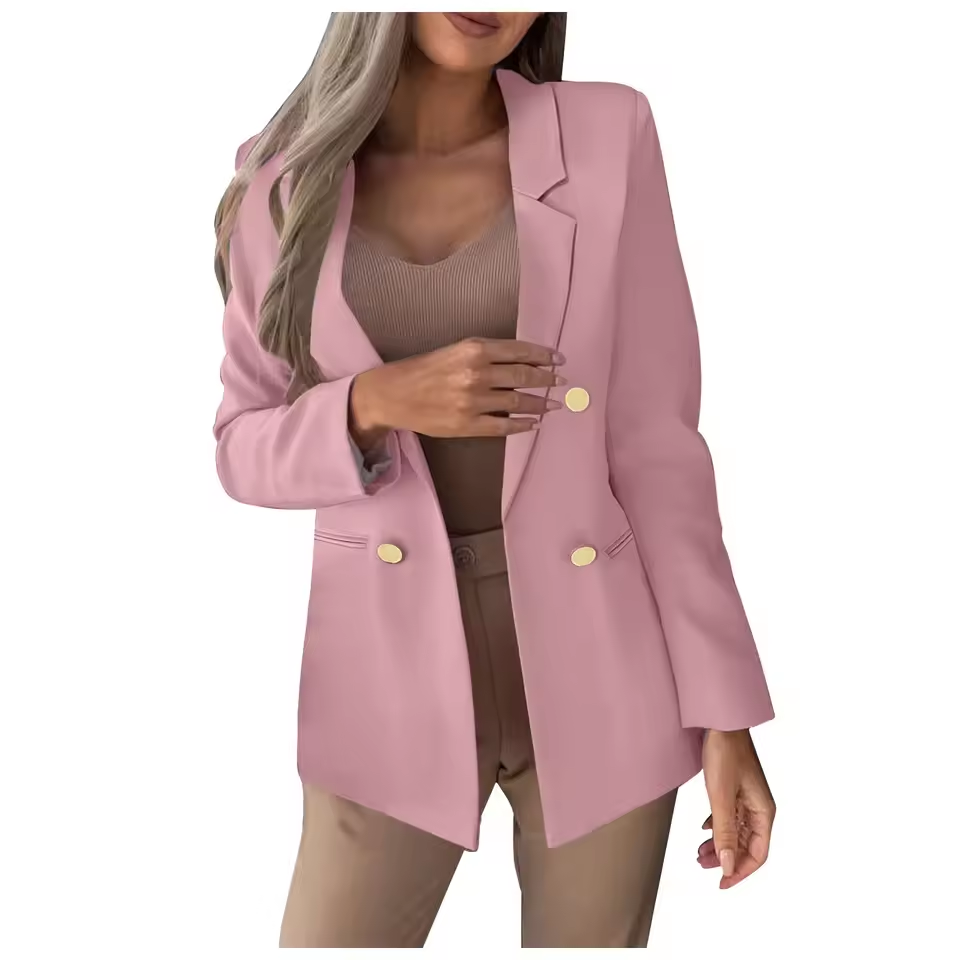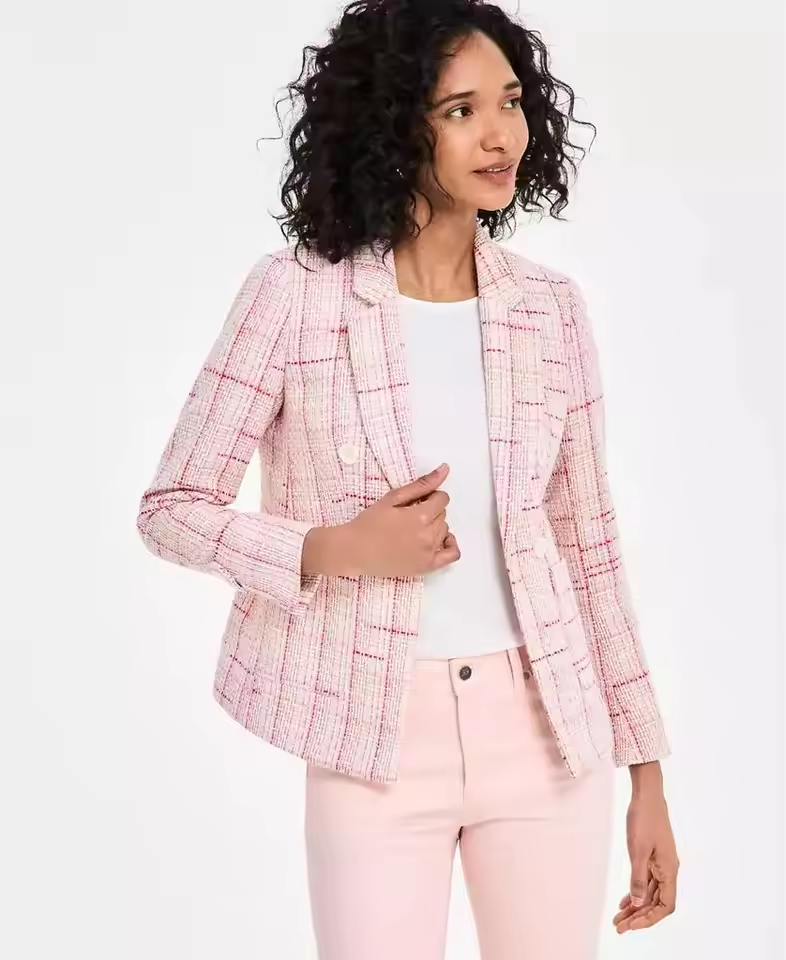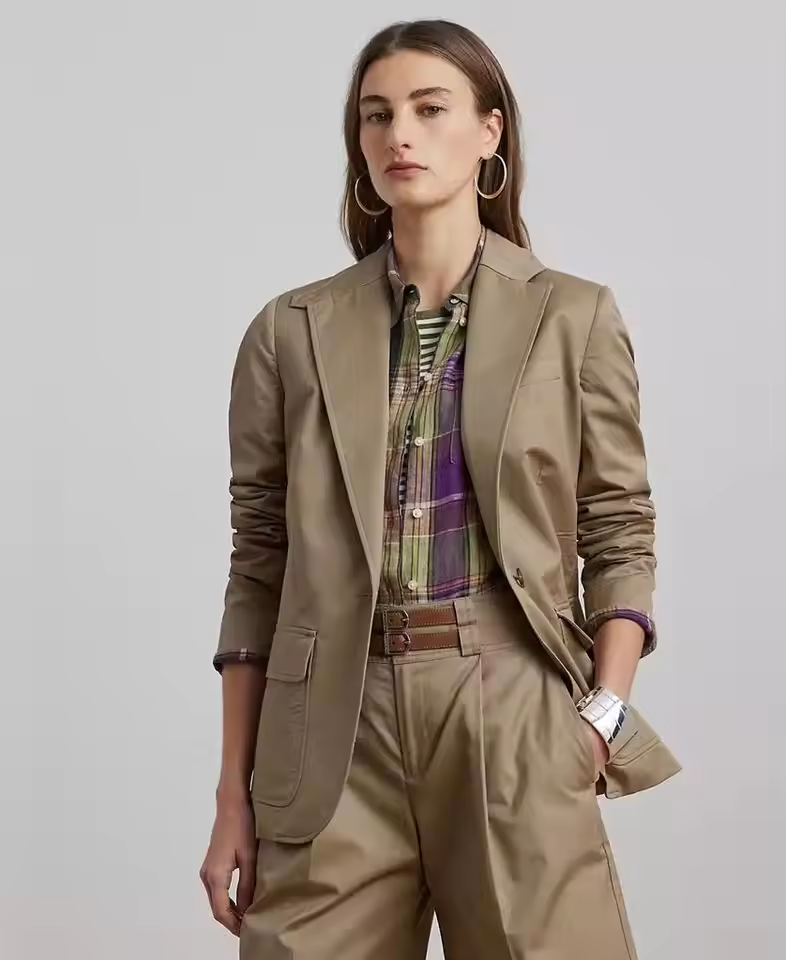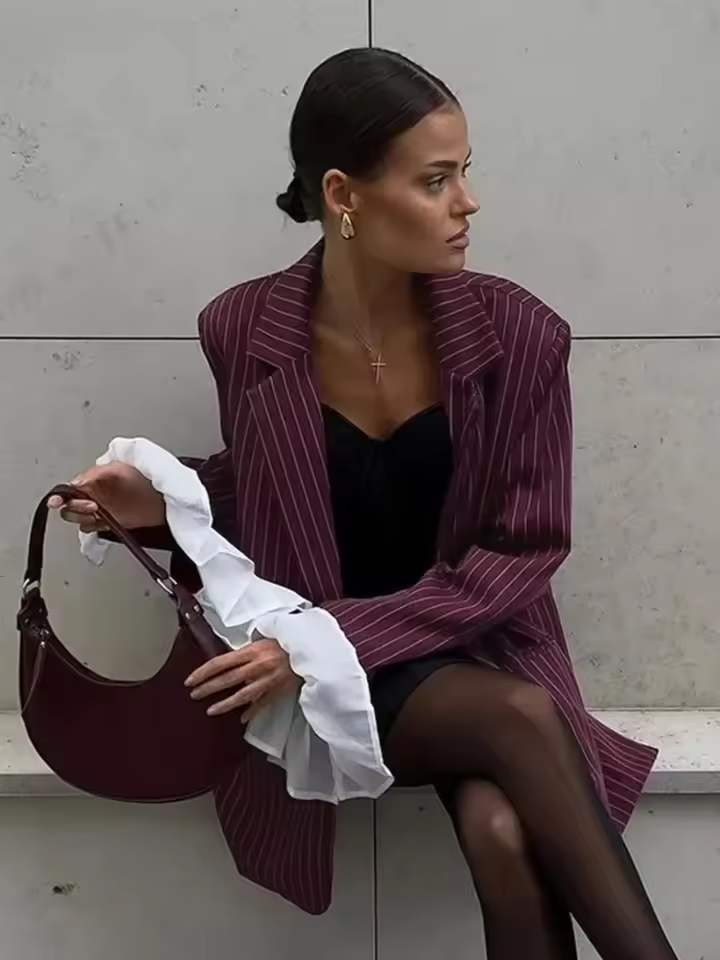Introduction: The Timeless Power of Blazers
Blazers are more than just outerwear—they are the Swiss Army knives of fashion. Whether you’re dressing for a boardroom meeting or a casual brunch, a well-tailored blazer instantly elevates your look. This guide dives into everything from blazer history to modern styling trends, ensuring you make the most of this wardrobe staple.
Why Blazers Matter:
- Professional Edge: A wool blazer can boost confidence in job interviews.
- Versatility: Pair with jeans for casual Fridays or a skirt for formal events.
- Sustainability: A high-quality blazer lasts 10+ years with proper care.
Cultural Impact:
- 1920s: Popularized by women’s suffrage movements as symbols of empowerment.
- Modern Era: Seen on runways of Stella McCartney and Tom Ford.
 How to Choose a Blazer: A Comprehensive Guide
How to Choose a Blazer: A Comprehensive Guide
A. Fit Analysis: The Key to Confidence
1. Shoulder Proportions:
- Broad Shoulders: Opt for blazers with natural shoulders to avoid exaggerating width.
- Narrow Shoulders: Structured shoulders (e.g., Notch lapel styles) add visual width.
2. Waistline Emphasis:
- Curvy Bodies: Choose women’s blazers for your body type with darts that contour the waist.
- Athletic Builds: Relaxed fits with a belted option to balance proportions.
B. Fabric Selection: Function Meets Fashion
- Wool Blends:
- Merino Wool: Soft and breathable for year-round use.
- Cashmere: Luxe option for cold-weather events (e.g., a blazer by Ralph Lauren).
- Cotton/Linen:
- Summer Essentials: Lightweight and ideal for spring/summer.
- Denim:
- Casual Elegance: Pair with tailored trousers for a modern twist.
C. Style Variations by Occasion
Professional Settings:
- Solid Colors: Navy, charcoal, or black for corporate environments.
- Tailoring: Double-breasted designs for formal meetings.
Casual Wear:
- Patterned Blazer: Plaid or houndstooth for weekend outings.
- Denim or Leather: Add edge to athleisure outfits.
D. Budget-Friendly Options
- Fast Fashion: Zara’s $50 linen blazer for everyday wear.
- Secondhand Shopping: Thrift stores often carry pre-owned designer pieces.
Blazer Styling Tips for Every Occasion
A. Professional Outfits
1. Boardroom Ready:
- Color Palette: Stick to neutrals (navy, black, charcoal).
- Layering: Pair with a silk blouse and pencil skirt for a polished look.
2. Creative Industries:
- Bold Colors: Coral or olive green for a creative edge.
- Textured Fabrics: Tweed or herringbone patterns.
B. Casual & Weekend Looks
1. Weekend Brunch:
- Denim on Denim: Pair a denim blazer with jeans and loafers.
- Layer Over Sweaters: Add a cashmere sweater for warmth and style.
2. Date Night:
- Evening Blazer: Opt for silk or satin finishes with a plunging neckline.
- Accessories: Add a clutch and statement earrings.
C. Seasonal Styling
Winter:
- Layer Over Knits: Pair with turtlenecks and ankle boots.
Summer:
- Lightweight Fabrics: Linen or cotton in pastel hues.
Women’s Blazers for Your Body Type: Tailored Solutions
A. Body Type Analysis
Apple Shapes:
- Key Fixes:
- Vertical Stripes: Create the illusion of elongation.
- Loose-Fit Blazer: Avoid tight waistlines that emphasize midriff.
Hourglass Figures:
- Best Options: Fitted blazers with waist definition.
Pear Shapes:
- Flattering Details: Peplum or A-line cuts to balance hips and waist.
B. Customization Tips
- Tailoring Services: Cinch the waist or shorten sleeves for a perfect fit.
- DIY Fixes: Add a belt to accentuate curves.
Best Blazer Brands: Luxury to Budget-Friendly
A. Luxury Brands
- Brioni: Italian craftsmanship with 30% wool blends for durability.
- Ralph Lauren: Classic preppy styles for timeless appeal.
B. Mid-Range Brands
- Zara: Affordable tailored blazers (50–100).
- J.Crew: Offers made-to-measure options for personalized fits.
C. Sustainable Options
- Eileen Fisher: Organic cotton blazers for eco-conscious shoppers.
- Reformation: Recycled fabrics and ethical production.
Blazer vs. Suit Jacket: Beyond the Basics
A. Functional Differences
- Suit Jackets:
- Purpose: Designed to match pants in fabric and color.
- Occasions: Weddings, formal events, or corporate boardrooms.
- Blazers:
- Versatility: Pair with jeans, skirts, or even dresses.
- Modern Twist: Seen in bold colors or unconventional materials like leather.
B. Styling Opportunities
- Blazer Hybrid: Pair a tailored blazer with high-waisted jeans for a casual look.
- Suit Jacket: Wear with matching trousers and a crisp shirt for formal events.
C. Cost Considerations
- Blazers: Generally cheaper than full suit sets.
- Suit Jackets: Invest in a high-quality set for lifelong use.
Advanced Styling Techniques
A. Pattern Mixing
- Stripes & Plaid: Pair a striped blazer with plaid trousers for a bold look.
- Solid Colors: Use neutrals to anchor busy prints in the outfit.
B. Accessory Pairings
- Statement Bags: Crossbody bags for daytime; clutch for evening.
- Footwear:
- Heels: Add height for formal events.
- Block Boots: Perfect for winter layering.
C. Color Psychology
- Neutral Tones: Black, navy, and beige for versatility.
- Bold Colors: Coral or mustard for creative industries.
Maintenance & Longevity Tips: Extending the Life of Your Blazer
A. Cleaning Methods by Fabric Type
1. Wool Blazer Care:
- Dry Cleaning: Essential for delicate wool blends.
- Home Spot Cleaning:
- Materials: Use a mild detergent (e.g., Woolite) and a soft brush.
- Technique: Blot stains gently; avoid rubbing to prevent pilling.
2. Cotton/Linen Blazer Care:
- Machine Wash: Use cold water and a gentle cycle.
- Drying: Air-dry flat to prevent stretching; never tumble dry.
3. Leather or Suede Blazer:
- Protective Spray: Apply a waterproofing spray (e.g., Scotchgard) annually.
- Brushing: Use a suede brush to remove surface dirt.
B. Storage Solutions for Long-Term Preservation
1. Hanger Selection:
- Padded Hangers: Prevent shoulder drooping in tailored blazers.
- Wire Hangers: Avoid these—they warp fabric over time.
2. Seasonal Storage:
- Vacuum-Sealed Bags: Ideal for off-season storage to reduce dust exposure.
- Clothing Racks: For frequent use, keep blazers on breathable racks.
3. Cedar Balls:
- Purpose: Repel moths and absorb moisture.
- Placement: Tuck into storage bags or drawers.
C. Spot Repair Techniques
1. Minor Tears or Snags:
- Fabric Glue: Use a clear adhesive (e.g., Aleene’s Tacky Glue) for small tears.
- Tailor Assistance: Reinforce seams for long-term durability.
2. Button Replacement:
- Matching Materials: Choose buttons that match the blazer’s fabric (e.g., mother-of-pearl for luxury blazers).
- Professional Help: Opt for a tailor for precise stitching.
3. Pilling Removal:
- Tools: Use a fabric shaver or pumice stone to gently remove pills.
- Prevention: Avoid rough fabrics in contact with wool.
D. Preventing Common Damage
1. Sunlight Exposure:
- Avoid: UV rays fade colors and weaken fibers.
- Storage Tip: Keep blazers in dark closets or use UV-protectant storage bags.
2. Over-Wearing:
- Rotation: Allow blazers to rest between wears to avoid fabric fatigue.
3. Perspiration Stains:
- Immediate Action: Blot stains with a damp cloth; avoid rubbing.
- Preventive Measures: Apply an underarm antiperspirant before wearing.
E. Professional Tailoring & Alterations
1. Hem Adjustments:
- Purpose: Ensure the blazer hits at the ideal length (mid-hip is classic).
2. Shoulder Padding:
- Adjustments: Remove excess padding for a modern, minimalist look.
3. Customization:
- Monogramming: Add initials for personalized style.
- Accessories: Add pockets or belt loops for functional upgrades.
F. Seasonal Care Guide
1. Winter Storage:
- Moisture Control: Use silica gel packets to absorb humidity.
- Pilling Removal: Use a fabric roller before winter storage.
2. Summer Care:
- Cool Storage: Keep blazers in a well-ventilated area to prevent mildew.
3. Travel Tips:
- Compression Packing: Use padded garment bags to avoid wrinkles.
- Avoid Overpacking: Don’t crush blazers under heavy luggage.
G. Eco-Friendly Maintenance Practices
1. Natural Cleaning Agents:
- White Vinegar: Mix with water to remove odors.
- Baking Soda: Sprinkle on fabric before brushing to deodorize.
2. Repair Over Replace:
- DIY Fixes: Mend loose buttons or hems instead of discarding.
- Sustainable Brands: Choose brands like Eileen Fisher that offer repair services.
3. Donation & Recycling:
- Secondhand Resale: Sell or donate gently used blazers to reduce waste.
H. Common Mistakes to Avoid
1. Over-Drying:
- Impact: Causes fabric shrinkage or discoloration.
- Solution: Air-dry instead of using high-heat settings.
2. Incorrect Ironing:
- Error: Ironing directly on fabric without a cloth.
- Fix: Use a pressing cloth and set iron to the fabric’s recommended temperature.
3. Neglecting Buttons:
- Issue: Loose buttons left unrepaired lead to fabric damage.
- Action: Replace buttons immediately using thread that matches the blazer’s color.
I. Expert Tips from Tailors & Stylists
1. Regular Check-Ups:
- Frequency: Have a tailor inspect blazers annually for loose threads or weakened seams.
2. Professional Dry Cleaning:
- Frequency: Every 3–4 wears for wool blazers; less often for cotton.
- Solvent Choice: Request eco-friendly perchloroethylene-free dry cleaning.
3. Air Your Blazer Daily:
- Why: Reduces odors and prevents mildew.
- Method: Hang blazers overnight after wearing to allow airflow.
Blazer Trends for 2025
A. Material Innovations
- Eco-Friendly Fabrics:
- Recycled Polyester: Used by brands like H&M Conscious Collection.
- Organic Cotton: GOTS-certified options from Eileen Fisher.
- Tech-Infused Fabrics:
- Moisture-Wicking: Ideal for active lifestyles (e.g., Lululemon’s adaptive styles).
B. Silhouette Shifts
- Oversized Blazers: Popular for a relaxed, gender-neutral vibe.
- Tailored Cuts: Remain essential for corporate settings.
C. Cultural Influences
- Retro Revival: 1990s-inspired velvet blazers from Gucci.
- Gender-Neutral Designs: Unisex styles from brands like COS.
D. Color & Pattern Predictions
- Neutrals: Earth tones like terracotta and olive green.
- Bold Accents: Neon lapels or metallic buttons for a pop of color.
Common Mistakes to Avoid
A. Fit Oversights
- Too Tight: Restricts movement and creates wrinkles.
- Too Baggy: Looks unprofessional in formal settings.
B. Fabric Missteps
- Synthetic Materials: Avoid for professional settings (opt for wool).
- Over-Textured Fabrics: Busy patterns can overwhelm petite frames.
C. Styling Errors
- Over-Accessories: Minimal jewelry works best with bold blazers.
- Mismatched Proportions: Ensure blazer length complements your frame.



